- Home
- Ben Stevens
The Whistler: A Murderer's Tale Page 3
The Whistler: A Murderer's Tale Read online
Page 3
Opening a black file with an embossed gold eagle in its centre, a swastika held in its talons, Sasse read for a while.
Then transferring his attention back to Schmidt, he said quietly, ‘Sachsenhausen isn’t the only concentration camp, Schmidt, and I’ve been instructed to obtain staff for one in Poland. You see what I’m getting at? That’s all I’ll say at this moment. You have a choice in the matter, which is more than you deserve: you can refuse or accept as you see fit.’
That he’d only the vaguest idea concerning what was on offer didn’t concern Schmidt in the slightest. This was a chance to escape captivity – there was nothing worse – and so he said, ‘I accept, Herr Commissioner.’
Staring hard at him, Sasse said, ‘You understand that you’ll have to obey every order without question or hesitation, no matter what you may think of it?’
‘Yes, Herr Commissioner.’
‘Then you’ll hear about this again. As for now, get back to work, so that you look forward to my next visit.’
A guard escorted Schmidt back outside. Upon his return, the guard stood waiting as Sasse spent several minutes rereading whatever was written within the file.
‘Go and get me this degenerate Grobauer,’ he eventually ordered.
It took the Commissioner the rest of the day to conduct brief interviews with some fifty other inmates. He was a great deal harsher with many of these than he’d been with Schmidt – for he couldn’t help but almost like that handsome young man.
It was no easy task Sasse had been assigned: to obtain thirty men from Sachsenhausen to act as barrack chiefs at a concentration camp in Upper Silesia, Poland.
His definite choices so far included Grobauer– the man was an absolute animal but he would follow orders faithfully; he would not be concerned about what he witnessed. There were a few others similar to him in character, and so naturally they would do as well.
But Schmidt…
Sasse puzzled over this particular inmate as he sipped a strong black coffee and scrutinised his file. Schmidt was an oddity; there was nothing remotely obvious about him, as there was with Grobauer and the rest of his ilk.
Sasse was certain that Schmidt had never actually enjoyed committing a crime (such a thing instead being done purely for something like financial gain) – and so he briefly wondered what on Earth gave this expressionless young man pleasure, if indeed there was anything.
Having been given far too important a task for a mistake to be made in the personnel department, the Commissioner vowed to consider Schmidt at length before matters were taken any further.
6
As Heinemann followed a steward from his dressing room towards the stage, he remembered how all his hard work at Stielke’s Music Academy had finally – after nearly four years – been rewarded.
He’d long since risen to become the Academy’s most promising student. Frau Stielke herself frequently boasted about the seventeen-year-old prodigy whom she’d discovered, dismissing the concerns of those who sought to remind her that for all his undoubted excellence he was still half-Jewish. The Nazis were only against full Jews, she argued: being a half-Jew – a Mischling – wouldn’t significantly affect Heinemann’s likelihood of becoming one of Germany’s finest musicians.
Such praise resulted in Heinemann being accepted to Berlin’s elite Humboldt University to continue his music studies a year before he would usually have been eligible. There was absolutely no point in him remaining at the Academy; he’d progressed as far as it was possible for him to go there.
To prepare for this transition Heinemann had already left the Academy’s dormitories for lodgings half an hour’s tram ride away, Frau Stielke having used her contacts to obtain the Mischling a room in a run-down house.
On the last day of July he finished at the Academy, saying a rather muted farewell to his classmates. Aware that they despised him both for his talent and his mixed-race, he was still largely unconcerned by the whispering and malevolent stares his thin person attracted.
The violin was his saviour, his guard against anything... unfortunate... befalling him. Despite being a Mischling he’d been accepted to Humboldt University – so he felt that he’d no real need to fear the rabid anti-Semitism that was fast developing within Germany.
The battered old instrument he’d found in his aunt’s attic had already been replaced by a far superior model, ‘leant’ (as she termed it) by Frau Stielke so that he could perform at whatever occasions she managed to arrange for him.
Such occasions had two purposes: firstly, to show him off to as many people as was possible; and secondly, to provide him with some money with which to pay his rent and purchase food. The pitiful amount he actually earned was of little importance to Heinemann. Technically he was a semi-professional musician, and as such he felt an undeniable thrill.
Back in his room, he lay on his mattress and read one of his few dog-eared books. From further along the landing there suddenly came hoarse, drunken singing. Heinemann swore, wondering if this would continue into the small hours as it had before, the old sailor who lived in another room on the first floor preventing him from getting to sleep.
But in spite of the racket he found his eyes closing more and more frequently as he attempted to read, until he dropped the book on his chest and slept…
…The grey light of dawn crept into the little room. Heinemann slowly awoke, gazing with half-opened eyes at the brown wallpaper, the large chest of drawers beside his bed...
Utter silence – the sailor never started his racket until late-afternoon at the earliest. Getting up off the bed and rubbing sleep from his eyes, Heinemann left his room and walked along the narrow landing to the communal toilet and bathroom.
Today he was due to perform for some of Berlin’s most important women, including – Stielke had already confided – the wife of a Gestapo Commissioner.
This selective clique periodically met in a nearby hall for a morning of coffee, cakes and conversation, so filling the dreary daytime hours until they could properly begin the riotous night-life that was the entitlement of the rich.
After breakfasting off the last of his bread and cold sausage Heinemann left the house carrying his violin, catching a tram and travelling the short distance to an area markedly more prosperous than his own.
His exit from the tram was observed by two members of the Sturmabteilung – the SA, the National Socialist’s paramilitary organisation – who muttered to each other but did not ask him for his papers. Heinemann followed Stielke’s written instructions to find the hall that was set in a small leafy park.
As he walked through an open wrought-iron gate, he observed the expensive cars parked along a surrounding street. Inside, the waiting chauffeurs were mostly taking the opportunity to snatch a quick nap. Heinemann then opened the large oak door of the hall straight into a huge room thick with the cloying atmosphere of perfume, tobacco, and coffee.
From out of the assembled throng – Heinemann had never imagined that there would be this many women – there suddenly appeared Frau Stielke. The women’s appearance was shockingly different from normal; she was dressed like something from a cabaret show in a white suit, which with her short and severely gelled hair would have made her appear almost androgynous, had it not been for her large bosom and a surfeit of glossy purple lipstick.
Clutching his arm with her stumpy little hand, she gabbled, ‘Erich, you must play well today, understand? It’s so important that you do.’
Despising the way his former tutor talked to him as though he was nothing but a child, Heinemann nodded curtly. The gathered women eyed him curiously as they drank strong coffee and smoke long white cigarettes, a few clearly displaying their dislike of the thin teenager.
These women considered it extremely stupid of Stielke to be associating with someone who was so obviously of Jewish origin. This could quite possibly bring trouble onto her beloved Academy and perhaps even herself – and not only from the authorities. Such types as the beer-swilling br
ownshirts – the more junior and rowdy members of the SA – could well take it upon themselves to punish her.
For these forty or so women the coffee morning was a regular occurrence, a chance for them to talk politely about topics that were never remotely serious. Some were deeply passionate about the National Socialist Party and proud of their husbands’ role in it, while others found the political climate frightening.
They’d seen acquaintances disappear from society because of their race or political beliefs; a few had even witnessed their husbands’ tears as the men attempted to explain what they were party to – what they dared not rebel against, in case the next knock that came in the dead of night was on their own door.
After thirty minutes or so had passed Heinemann walked onto a small stage that was to one side of the hall, a manuscript placed on a stand in front of him. He’d dressed as smartly as he’d been able, but still his black trousers were faded with age and his jacket a little threadbare.
The music placed on the stand was Stielke’s attempt at creating some kind of appropriate ambience for his recital, though he would as normal be playing from memory. Usually, he had only to hear a piece two or three times and he was able to perform it in its entirety.
Stielke waddled over to stand in front of him and gave the introduction.
‘Ladies, I give you possibly the finest young violinist to come out of my Academy for a long, long time. He is from a little village called Hegensdorf, and his name is Erich Heinemann. And that, really, is all that needs to be said.’
Many of the faces at which Heinemann now stared were hard and contemptuous. They spoke volumes about their owners’ lifestyles: late nights, cocaine, champagne, sexual degeneracy – all the distractions that helped them ignore the fact that their country had, somewhere along the line, gone bad.
Adjusting the violin on his shoulder, readying himself to play, Heinemann couldn’t remember ever feeling so scared in his life. He longed suddenly to return to Hegensdorf – to his aunt and the golden, nostalgic years of his childhood. But he knew that he was dreaming: the Nazi disease would already have spread to that village and poisoned its inhabitants. He would be about as welcome there as he was here in Berlin.
His past was dead and gone, he was on his own, and for his sake he’d better start working.
He fretted about such things for perhaps the first sixteen bars of his recital – and then he was gone, his mind willingly losing itself in the unfathomable depths of classical music.
Every part of him became involved with the momentous struggle of discovering the way in which this particular piece should be performed; and for all that he was aware of his surroundings, Erich Heinemann might just as well have been playing on the moon.
7
Loud applause greeted Heinemann’s entry onto the stage. Schmidt leaned slightly forward, his usually cold blue eyes now burning with something that appeared suspiciously like pride as he stared at the violinist.
It’s because of me Schmidt told himself. He is able to perform tonight because of me.
Time enough, just before Heinemann and the orchestra began to play, to remember another of the events that had ultimately led to Schmidt again seeing the thin violinist.
It had come at a time when Schmidt really had begun to have enough of the Sachsenhausen concentration camp. The conditions were atrocious, he had lost considerable weight, and even his formidable constitution was beginning to buckle under the strain.
Despite his ordeal a firm belief had become established in his mind: whatever Commissioner Sasse had to offer him as an alternative to this loathsome imprisonment would soon be revealed.
At last his wait ended: thirty convicted criminals including himself were one day ordered to stop their gruelling fatigues, and were marched across the camp and into the main building.
Entering a large room they saw two men, one of whom was Commissioner Sasse of the Berlin Gestapo. Sasse’s fat face was stern and set; it carried the distinct suggestion that a struggle lay ahead. More than a few of the selected inmates found it difficult to look at – for it carried uncomfortable memories of interrogations and beatings.
The other man – attired in a black uniform with Death Head shoulder epaulets and a cap with both the iron eagle and the skull and bones motif – swept the group of emaciated men with an imperious glare.
But when he spoke his words were strangely polite, given the group of vagabonds and worse whom he was addressing.
‘Gentlemen. It’s been some time since you’ve been labelled as such, but should you so decide your days of imprisonment are now over.
‘I, Rudolf Hoess, offer you the chance to again be free in return for you serving your country. This offer of service entails no personal risk to your life as, for example, does that of being a soldier or an airman. The offer I am about to present you is subject to the highest security classification, and on pain of death is not to be discussed even among yourselves.
‘As you are doubtless aware, the majority of the misfortunes which have befallen the Fatherland in the past are the fault of the Jewry, and their eternal and insatiable greed…’
For over an hour Hoess detailed in a detached, scientific manner the nature of what was on offer. Any scruples the selected prisoners may have had concerning it were curtailed by the freedom it afforded them.
This the authorities had already foreseen: their histories had been meticulously checked, so to ascertain that they were indeed ‘compatible’. Also, a psychiatric report on each man had been prepared, using information obtained through Sasse’s interviews.
But unlike several of the other prisoners, there was not the slightest struggle of conscience taking place within Schmidt’s mind as Hoess spoke. Schmidt merely understood that he was going to assist in supervising a camp even more severe than Sachsenhausen, and felt something bordering on relief at finally being able to leave this prison.
Having finished his speech, Hoess paused for effect before saying quietly, ‘Anyone who does not feel capable of such a task should say so now.’
But every man was silent, prepared to do whatever they were told in return for this remission of their sentences.
Hoess nodded, and said, ‘Well then, that’s settled. Your release from this camp is immediate. We will furnish you with your uniforms and casual clothing when you reach Auschwitz. The journey to Poland will be tonight, after you’ve eaten a decent meal. Heil Hitler!’
The former inmates awkwardly returned the Nazi salute and walked stiffly out of the room. Taking no notice of the accompanying guard or of Hoess’s warning not to discuss what had just been said, Grobauer said loudly, ‘Well boys, looks like we’ve landed on our feet – we’re free of this stinking crap-hole and we’re going to teach the Jewish scum a lesson or two.’
One of the few men who did not laugh at Grobauer’s words was Kurt Schmidt, and Grobauer looked hurriedly away upon meeting his eye. In Schmidt’s expressionless face there somehow lay the promise to destroy whatever threatened his safety.
8
Heinemann was vaguely aware that there were approximately two and a half thousand people sat in this hall tonight. Tickets had quickly sold out, as he now gave no more than three concerts a year in England.
Once, in Tokyo during the 1960s, he’d performed to an audience of around twenty thousand. That, he believed, had been his largest ever single audience. It had set some sort of record at the time, he seemed to recall.
But how many people had he performed to all those years ago, at the coffee morning held for some of Berlin’s wealthiest women? Maybe fifty or sixty? Certainly no more than that.
What he knew for certain was that he had, virtue of his violin playing, succeeded in melting even the hardest of female hearts. Even those women who were aware of the fate that usually befell those who ‘disappeared’ – who actually welcomed the fledgling plan that would become ‘The Final Solution’ – had been touched by the melancholic piece performed by the teenager, a few moved to minor
tears.
When he’d finally put down his instrument and left the stage it had been to loud applause, and for the remainder of the morning he’d found himself answering the many questions that were fired at him:
How old was he? Where did he come from again? What about family, friends? Frau Stielke shadowed him but didn’t interrupt, red with pride as her prodigy spoke with the wife of Commissioner Sasse of the Berlin Gestapo.
When Heinemann had moved on, Sasse’s wife said discreetly to Stielke, ‘Don’t you worry yourself, Olga. I will speak with my husband, and see if we cannot guarantee the little Mischling’s safety.’
The patronising tone of Frau Sasse’s voice implied her power over those around her, as did her use of Stielke’s first name in conversation. This bordered on being impolite, for only close friends used each other’s Christian names in conversation.
Stielke, however, took no notice of such things and was almost pathetic in her gratitude, reflecting on just how fortunate it was that this woman had taken such a quick liking to the youth. The whispered joke of the moment concerned Sasse being scared more of his wife than the Fuhrer, and of him endeavouring to do whatever she requested.
As the women began to leave, Heinemann realised that the month ahead now contained various performances he was booked to play. It was Stielke who entered the women’s requested dates in her pocket diary.
Heinemann was at last left alone outside, reflecting upon the sudden advice given to him by Frau Sasse just before she and Stielke had got into a waiting car.
‘If you happen to have any problems, simply mention my husband’s name, Erich. I think you know who he is, don’t you?’
Heinemann had politely thanked her without quite knowing what she meant – and then he’d caught the chauffeur looking at him. The hate-filled stare was immediately dropped as he noticed it, but it was enough to make him fully appreciate that these were extremely dangerous times, and that his very life could depend upon the protection afforded him by people like Frau Sasse.

 Hostile Genus: An Epic Military Sci-Fi Series (Invasive Species Book 2)
Hostile Genus: An Epic Military Sci-Fi Series (Invasive Species Book 2)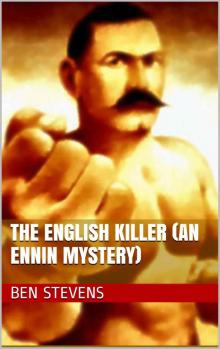 The English Killer (An Ennin Mystery) (The Ennin Mysteries Book 31)
The English Killer (An Ennin Mystery) (The Ennin Mysteries Book 31) The Ennin Mysteries: Collected Series 1 – 5 (25 Stories) MEGAPACK
The Ennin Mysteries: Collected Series 1 – 5 (25 Stories) MEGAPACK Tokyo Zombie Apocalypse
Tokyo Zombie Apocalypse The Strange Case of the Disappearing Dragon (An Ennin Mystery #32)
The Strange Case of the Disappearing Dragon (An Ennin Mystery #32) I, Hell
I, Hell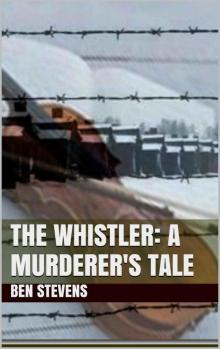 The Whistler: A Murderer's Tale
The Whistler: A Murderer's Tale Parker: The Story of an Apocalypse Survivor: COMPLETE SERIES
Parker: The Story of an Apocalypse Survivor: COMPLETE SERIES Confessions of a Japanese Temple Gardener: (P.S – Who's from London, England)
Confessions of a Japanese Temple Gardener: (P.S – Who's from London, England)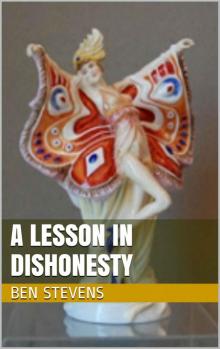 A Lesson in Dishonesty
A Lesson in Dishonesty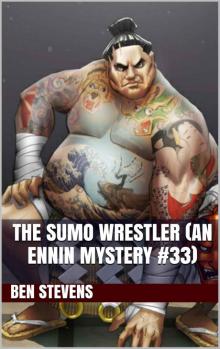 The Sumo Wrestler (An Ennin Mystery #33)
The Sumo Wrestler (An Ennin Mystery #33)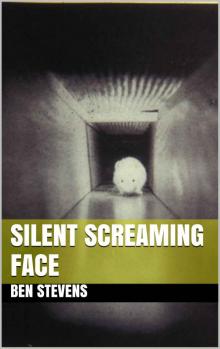 Silent Screaming Face
Silent Screaming Face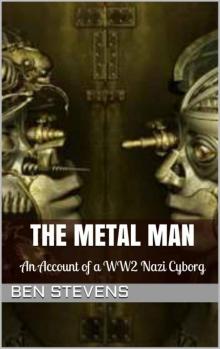 The Metal Man: An Account of a WW2 Nazi Cyborg
The Metal Man: An Account of a WW2 Nazi Cyborg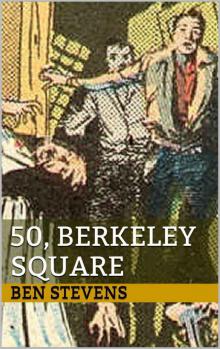 50, Berkeley Square
50, Berkeley Square A Ghost
A Ghost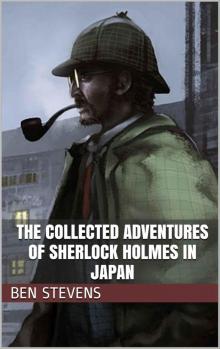 The Collected Adventures of Sherlock Holmes in Japan
The Collected Adventures of Sherlock Holmes in Japan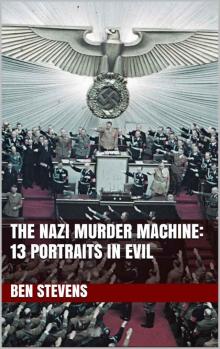 The Nazi Murder Machine: 13 Portraits in Evil
The Nazi Murder Machine: 13 Portraits in Evil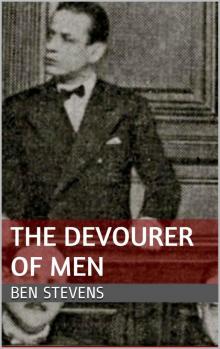 The Devourer of Men
The Devourer of Men Metal Man
Metal Man The Egyptian Tomb Raider (An Ennin Mystery #34)
The Egyptian Tomb Raider (An Ennin Mystery #34) Big Sound Temple
Big Sound Temple The Ennin Mysteries: Collected Stories 26-30
The Ennin Mysteries: Collected Stories 26-30